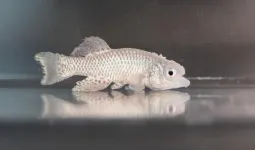(Press-News.org) Scientists know very little about conditions in the ocean when life first evolved, but new research published in Nature Geoscience has revealed how geological processes controlled which nutrients were available to fuel their development.
All life uses nutrients such as zinc and copper to form proteins. The oldest lifeforms evolved in the Archean Eon, three and a half billion years before the dinosaurs first appeared. These microbes showed a preference for metals such as molybdenum and manganese compared to their more recent counterparts. This preference is thought to reflect the availability of metals in the ocean at that time.
Researchers from the University of Cape Town (UCT) and the University of Oxford recreated ancient seawater in the laboratory. They found that greenalite, a mineral that is common in Archean rocks, forms rapidly and removes zinc, copper, and vanadium in the process. As greenalite was forming in early oceans, these metals would have been removed from seawater, leaving it rich in other metals, such as manganese, molybdenum, and cadmium. Intriguingly, the metals they predict would have been most abundant in Archean seawater match those chosen by early lifeforms, explaining why they were favoured during early evolution.
Lead researcher Dr Rosalie Tostevin (University of Oxford at the time of the study, now Senior Lecturer in the Department of Geological Sciences at UCT), said: “We were very excited when we noticed that our results match predictions from biologists who use a completely different approach. It is always reassuring when specialists in other fields are making similar findings.”
Scientists agree that the Archean seawater was very different from today, with more dissolved iron and silica and little to no oxygen. However, there is little agreement about other aspects of seawater chemistry, such as the concentration of nutrients.
“We can’t go back in time to sample seawater and analyse it, so reconstructing Archean conditions is quite a challenge. One approach is to look at the chemical makeup of sedimentary rocks, but the chemistry of very old rocks has sometimes been altered. We instead decided to create a miniature version of ancient seawater in the laboratory, where we could directly observe what was happening,” said Tostevin.
Tostevin and her colleague Imad Ahmed recreated Archean seawater inside a special oxygen-free chamber and watched as greenalite began to form. They observed dramatic changes in the metal concentrations in seawater as the minerals formed. They used X-ray adsorption Spectroscopy at the Diamond Light Source synchrotron to prove that the metals were entering the minerals. In contrast, other metals were unaffected by this process and stayed at high levels in seawater.
Tostevin said: “We know that greenalite was important on the early Earth because we keep finding it in old rocks, such as the iron ore in the Northern Cape, South Africa, and similar rocks in Australia. We think this may have been one of the most important minerals in the Archean. But we don’t know exactly how greenalite was forming in nature. One possibility is that greenalite formed deep in the ocean at hydrothermal vents. But it could also have formed in shallow waters, wherever there was a small change in pH.” Tostevin and Ahmed decided to run their experiments under both types of conditions and found that regardless of how greenalite forms, it removes metals in a similar way.
One question that concerned the researchers was whether the metals would be locked up for a long time or released back into seawater after several months or years. To test this, they heated the minerals to emulate what happens in nature when they are buried and undergo crystallisation. The metals remained trapped in the mineral, suggesting this was a permanent sink for metals that would have profoundly impacted early seawater.
Media contacts:
Dr Rosalie Tostevin: rosalie.tostevin@uct.ac.za
The study Tostevin & Ahmed, 2023: 'Micronutrient availability in Precambrian oceans controlled by greenalite formation' will be published in Nature Geoscience at 16:00 GMT / 11:00 US Eastern Time, Monday 13 November 2023.
The study will be available online after the embargo lifts: https://www.nature.com/articles/s41561-023-01294-0 doi: 10.1038/s41561-023-01294-0
About the University of Oxford
Oxford University has been placed number 1 in the Times Higher Education World University Rankings for the eighth year running, and number 3 in the QS World Rankings 2024. At the heart of this success are the twin-pillars of our ground-breaking research and innovation and our distinctive educational offer.
Oxford is world-famous for research and teaching excellence and home to some of the most talented people from across the globe. Our work helps the lives of millions, solving real-world problems through a huge network of partnerships and collaborations. The breadth and interdisciplinary nature of our research alongside our personalised approach to teaching sparks imaginative and inventive insights and solutions.
Through its research commercialisation arm, Oxford University Innovation, Oxford is the highest university patent filer in the UK and is ranked first in the UK for university spinouts, having created more than 300 new companies since 1988. Over a third of these companies have been created in the past five years. The university is a catalyst for prosperity in Oxfordshire and the United Kingdom, contributing £15.7 billion to the UK economy in 2018/19, and supports more than 28,000 full time jobs.
END
Recreation of ancient seawater reveals which nutrients shaped the evolution of early life
2023-11-13
ELSE PRESS RELEASES FROM THIS DATE:
Cycle of fasting and feeding is crucial for healthy ageing
2023-11-13
Fasting interventions, which involve alternating periods of fasting and refeeding, are generally thought to improve health. But these interventions don’t work as well in old animals. The question is: Why? By studying the short-lived killifish, researchers at the Max Planck Institute for Biology of Ageing in Cologne have shown that older fish deviate from a youthful fasting and refeeding cycle, and instead enter a state of perpetual fasting, even when ingesting food. However, the benefits of refeeding after fasting in old killifish can be restored by genetically activating a specific subunit of AMP kinase, an important sensor ...
How climate change could be affecting your brain
2023-11-13
A new element of the catastrophic impacts of climate change is emerging – how global warming is impacting the human brain.
In a paper published today in Nature Climate Change, an international team of academics explore the ways in which research has shown that a changing environment affects how our brains work, and how climate change could impact our brain function in the future. The paper is led by the University of Vienna with input from the universities of Geneva, New York, Chicago, Washington, Stanford, Exeter in the UK and the Max Plank Institute in Berlin. It also explores the role that neuroscientists can play in further understanding and addressing ...
Reducing systolic blood pressure to less than 120 mm Hg reduced cardiovascular event risk
2023-11-13
Research Highlights:
In a 3-year trial, intensive treatment with antihypertensive medication to reduce systolic blood pressure, the top number, to less than 120 mm Hg reduced cardiovascular disease events among people at high-risk for cardiovascular disease by 12% compared to standard treatment with a target of less than 140 mm Hg.
The effects were consistent regardless of participants’ diabetes status (Type 1, Type 2 or none) or history of stroke.
Embargoed until 8 a.m. ET, Monday, Nov. 13, 2023
PHILADELPHIA, ...
Ovarian cancer: Artificial intelligence predicts therapy responses
2023-11-13
A model based on artificial intelligence is able to predict the therapy outcome (measured by volumetric reduction of tumor lesions) in 80% of ovarian cancer patients. The AI-based model has an accuracy of 80%, significantly better than current clinical methods. The tool, named IRON (Integrated Radiogenomics for Ovarian Neoadjuvant therapy), analyzes various patient clinical features, from circulating tumor DNA in the blood (liquid biopsy) to general characteristics (age, health status, etc.), tumor markers, and disease images obtained through CT scans. ...
American Heart Association honors Gladstone President Deepak Srivastava with Distinguished Scientist Award
2023-11-13
Deepak Srivastava, MD, president of Gladstone Institutes and a renowned cardiovascular researcher, took the stage on Saturday in Philadelphia to receive the American Heart Association’s Distinguished Scientist award—joining a preeminent group of scientists and clinicians who’ve earned the association’s highest honor over the past decade.
The American Heart Association applauded Srivastava for his significant, original, and sustained scientific contributions that have advanced the association’s mission: “To be a relentless ...
Second-most distant galaxy discovered using James Webb Space Telescope
2023-11-13
The second- and fourth-most distant galaxies ever observed have been discovered in a region of space known as Pandora’s Cluster, or Abell 2744, using data from NASA’s James Webb Space Telescope (JWST). Following up on a deep field image of the area, an international team led by Penn State researchers confirmed the distance of these ancient galaxies and inferred their properties using new spectroscopic data — information about light emitted across the electromagnetic spectrum — from JWST. At nearly 33 billion light years away, these incredibly distant ...
Researchers explore origins of lupus, find reason for condition’s prevalence among women
2023-11-13
For years, researchers and clinicians have known that lupus, an autoimmune condition, occurs in women at a rate nine times higher than in men. Some of the factors that cause the disease’s high prevalence in women have eluded discovery, but in a new study investigating the immune system processes in lupus and the X chromosome, Johns Hopkins Medicine researchers have uncovered answers about the disease’s frequency in females.
A number of dysregulated genetic and biological pathways contribute to the development of lupus and its varied symptoms of muscle and joint pain, ...
Capture or reuse CO2 as a chemical source for the production of sustainable plastics
2023-11-13
A scientific team has developed a new polyurethane production technique using CO2 to create new types of easily recyclable plastics. The study, published in the Journal of the American Chemistry Society (J.A.C.S.), could provide a solution for the development of truly sustainable plastics.
Commodity plastics have transformed global industry. Whether in construction, clothing, vehicles or food packaging, these plastics are everywhere in our daily lives, so much so that their global use has been estimated at around 460 million tons in 2019. This number is staggering, but not surprising, because plastics, also known as synthetic polymers, have met a large ...
Self-deception may seed ‘hubris balancing,’ leading to Putin’s war against Ukraine
2023-11-13
Strategy underlies the affairs of national leaders, including how they view and interact with other states — but what if such strategy is borne of self-deception? That’s the thrust of a novel international relations theory that Ryuta Ito of Hiroshima University has now expanded upon, providing psychological rationalization to explain the irrational acts of national leaders at war.
Ito penned his reasoning on Sept. 5 in the journal International Affairs.
“Why did Vladimir Putin decide to invade Ukraine in 2022?” asked Ito, assistant professor in the Graduate School of Humanities and Social Sciences at Hiroshima University. ...
Appropriate statin prescriptions increase sixfold with automated referrals
2023-11-13
PHILADELPHIA— The odds of prescribing the appropriate dose of statins—a medicine used to lower “bad” cholesterol levels—increased sixfold when automated referrals were made to pharmacy services, instead of relying on traditional prescribing methods, according to researchers at the Perelman School of Medicine at the University of Pennsylvania. More than 90 million people in the U.S. use statins, making it one of the most prescribed medications in the county. Despite their effectiveness in lowering cholesterol levels and the risk of cardiovascular ...



